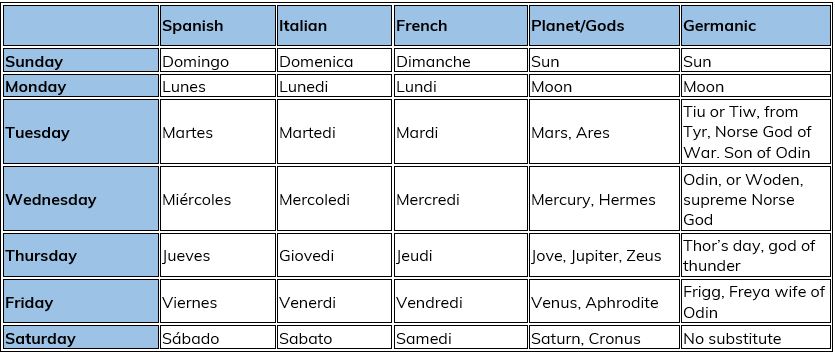7 on/7 off. The backbone that sets the routine for about 50% of hospitalist groups. The 7 days on seem endless, and those days off flash by in an instant. From working hard to hardly working. The Systole-Diastole model with blood rushing from highs to lows, coursing through the hospital thrill ride for a week, then off to the Merry Go Round of Life.
Each day has its feel and rhythm. The EDM of the first day on service grooves into a calmer reggae vibe by Saturday and heads to heavy metal Monday.
The starting day of the 7 days plays a big role in the shape of the week. My group decided early to start on Wednesday. Hump day became the launching pad into the cyclical week-long journey in the hospital. Astrology, chronology, etymology and humoral medicine can help explore each day.
We tell our patients they will feel better in about 7 days, to take the Keflex for a week, and we schedule that follow up a week from today. Everything lines up subjectively to magical 7s. Even we know that’s more convenience-based guessing then science.
The week’s length arose from the biblical story of the 7 days of creation, which likely had its basis in the approximate 7 days of the moon phases. Once the Romans adopted the 7-day week, it stuck. The names for the days of the week came from the 5 visible planets at the time they were named, plus the Sun and the Moon. French, Spanish, and Italian names for the days encoded their planetary birth. The English names came from Germany via the Babylonians.

The start of the hospitalist work week, Wednesday, comes from Mercury, as in mercredi in French, miércoles in Spanish. In English, Wednesday’s origin is from the Norse mythology supreme God, Odin or Woden. Mercury is the messenger god and the speediest of the planets. This seems fitting for the start of the hospital week. The first day flies by with that new list. 1 o’clock already? I barely saw half my list!
It has a mercurial feel to it, walking into the unknown, with the thrill of getting that new patient roster. Who will it be? All critically ill? A smattering of consults? Everyone wrapped up with a clear plan? All the discharges ready to go? Or will it be filled with those vague cases, cryptic notes listing symptoms and no diagnosis, stating more tests in the AM if no change.
Mercury, the Roman god, has many other deeper meanings for healthcare, making him a fitting one to salute to on day one. He was a messenger to the underworld, the circulation system for the gods. He possessed the Caduceus, one of the symbols of medicine. Mercury the compound, known as quicksilver, was part of the physician’s treatment for many maladies, such as syphilis, for centuries. Unfortunately, it was a toxic treatment, one of many where the physic was better off doing nothing.
Enter Thursday, from Thor’s Day, the day when you begin to feel more powerful, more confident in your list. Its origin is Jupiter (Jove), as in jeudi in French, jueves in Spanish. You are wielding Thor’s hammer this day. All the discharges that should have happened yesterday are ready first thing in the morning. Only 2 days in, a lot of energy, and the hospitalist can take on the world, climb Mount Olympus, feel like Jupiter, the king of the gods, as well as Thor. You are not yet Fat Thor, abandoning the Avengers. No. On Thor’s day, you say yes to those committee meetings in the afternoon, give a short talk to nursing, and still fit in a couple of family sessions.

Mercury by Henrik Goltzius, 1611
Friday is named after Friya, the wife of Odin. Similarly, Friday’s origin is from Venus, the Roman goddess of love, as evident in the French name for Friday, vendredi. Friday is a day we’d love to get out of the hospital early. It’s the start of everyone else’s weekend, yet the middle of the hospitalist’s week. Venus bequeathed us the words venereal disease. Friday’s then should remind us to take that full history, including the sexual history. You may have to prescribe some Mercury, but you don’t know if you don’t ask.
Saturday, clearly named after Saturn, the Roman Titan god and fifth planet from the sun. This is often the first peaceful day of the hospitalist work week, when the hospital appears to be slowing down. Fewer admissions, fewer consults and often less available hospital services. A day to linger a little longer with patients. Yet, in that peace, lies a bit of melancholy, knowing everyone outside the hospital is enjoying their weekend. Saturnine means to have a melancholy disposition, originating from humoral theory. Melancholy also is a relic from humoral medicine. Its etymology is from the Greek roots black and bile, melan- and khole-, giving us melena, cholecystectomy, and choleric. Black Bile: one of the four humors. Those with black bile, melancholy, were born with the planet Saturn rising in the evening sky. This is also a day to remember to look out for lead poisoning and its sequelae, Saturnine gout. Saturn the god, known as Cronus in Greek mythology, and the origin for words such as chronology and chronic. Watch out for those end of Saturday codes, as Cronus is often depicted as Father Time, an old man with a scythe.
Finally, Sunday, has arrived, the day of rest. The sun begins to shine a little, the work week is nearing its end, and the pace slows. Here’s a day where only emergent procedures are done; consultants seem to have left by 7 am or will only show up after 1pm. With hospitalist staffing the same, it does become a bit of respite. On a good Sunday, you may see the same number of patients as Thursday, yet complete rounding 3 hours earlier. Though shadows emerge, as many of those patients on the list can’t discharge over the weekend, because of facilities closed, or waiting on testing. The sun sets peacefully, but the moon begins to peak in the horizon.
Monday is named after the moon: Moon Day. This day echoes the full moon and should never be the first day of a hospitalist’s 7-day week. It starts off fairly benign, following a slow Sunday night. Yet, by late morning, by noon, chaos rears its ugly head. Admissions, post-operative consults, and transfers pour in from a wide open spicket. The wolves howl in the background. The week felt like it was winding down, the light at the end of the 7-day tunnel, yet the full moon rises, and the 12-hour day is not long enough. The other word for moon is lunar, from the Latin luna, hence lundi in French or lunedi in Italian. Of course, the words for the full moon behavior of lunacy in lunatics, from the pull of the moon.
Tuesday arrives and the work week ends, peacefully. Though this day is named after Mars, the god of War, as in Mardi. The Norse god of war was Tyr or Tiu, son of Odin, hence Tiu’s Day, Tuesday. This should be a pleasant day to wrap up loose ends, but often becomes a battle day where everything collides as you try to digest Monday’s multiple new admissions. All the bed emptying from yesterday didn’t last long. This day feels like the biggest challenge; steam is running out after seven days, with the day spent prepping for the handoff, discussing that warm handover with all your patients, and pecking out those in-depth notes for the oncoming hospitalist.
7 on/7 off is simple to arrange and is a favorite for travelers, families without school-age kids, or new hires out of residency. I think I would prefer a Monday to Friday, working more days, and less weekends. That schedule seems healthier for those with a partner working the work week, kids in school, and those who want to match a work/life balance with the rest of the 9-5 world. I’m in favor of options, and like to see groups, as they mature and grow, offer choices.
It’s clear that the more days on in a row, the less disruption with patient care, as well as a higher likelihood of patient discharge. Though, I’m wary of the folks doing 2 weeks straight, or more, and then 2 weeks off. I spent my academic career with month at a time on service, with one weekend off a month. That was continuity for patients, but unsustainable.
The 7 days off seem like they should help improve burnout, yet hospitalist rates of burnout remain elevated. The schedule and how it’s executed definitely plays a role. How flexible is your team’s ability to arrive and leave? Those days on are challenging, fairly inflexible leading to limited autonomy. The days off – even calling them days off – leads to less engagement in hospital improvement activities and overall participation in the team and the culture. Each hospitalist is not in the hospital half the year.
What’s your start day? What’s your schedule like? Every group has their rationale, and it’s always good to reexamine your schedule every once in a while, to see if it’s truly best for your group, for hospital medicine. 7 on/7 off has a good balance – good for the humors. But sometimes what seems to be scheduled with ease can quickly lead to dis-ease. You may want to throw in a conversation with the gods to sort it out.
They are watching us. The Greek gods, the Roman gods, the Norse gods.
And they are with us.
Every day.
For more about scheduling:
Read Leslie Flores’ 2016 Hospital Leader post on 7 on/7 off.
Read John Nelson’s 2016 Hospitalist piece on scheduling as well.


Leave A Comment